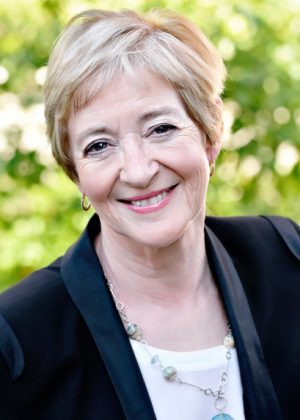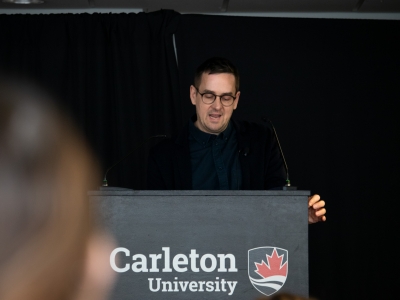 Maude Barlow, one of Canada’s greatest advocates for human rights and environmental justice, will deliver the FPA Currents Lecture on September 20 at the Carleton Dominion-Chalmers Centre. The event is hosted by the Faculty of Public Affairs.
Maude Barlow, one of Canada’s greatest advocates for human rights and environmental justice, will deliver the FPA Currents Lecture on September 20 at the Carleton Dominion-Chalmers Centre. The event is hosted by the Faculty of Public Affairs.
Entitled “The Power of Hope in a World of Challenges,” Barlow’s lecture will draw on a lifetime of activism as shared in her recent book, Still Hopeful.
The memoir was inspired by an experience Barlow had a few years ago at a climate change event in Ottawa that was filled with young people.
“There was lot of doom and gloom language, as in ‘We only have 10 years left for a livable planet,’” recalls Barlow. “I had a 16-year-old granddaughter in the audience, and I was really acutely aware of what these messages must have meant to people of that age. I walked home that night thinking, ‘I need to shift my thinking to speak to a new generation. We have to give positive solutions and positive examples of what can change and where change is happening.”
Barlow offers many examples in her book, including the movement for Indigenous rights; work on treaties governing plastics, methane, and deep-sea ocean mining; and the 30 x 30 biodiversity campaign, to name a few.
As a lifelong activist, she knows that those who want to make a difference can experience burnout when there is no sign of progress. But she says the key is changing your definition of success.
“You can’t judge success solely by whether you got what you wanted when you wanted it,” explains Barlow, who led the fight against the free trade agreement with the United States in the late 80s as chair of the Council of Canadians. “That kills activism. You just don’t know when you’re going to have a win. You don’t know when the tide is going to turn. But you have to plant the tree, as they say, even though you might not get to sit under its shade.”
Barlow has experienced the ups, downs, and sideways changes that come with global activism. She has been a leader in the battle against free trade and globalization, the global fight for water justice, and the women’s movement. She cites the latter as a perfect example of how an activist cause can evolve over time.
“For a lot of women, it was 50-50: I want 50% of the power, I want half of the boardroom to be women,” says Barlow. “But I think with time we realized that it wasn’t that we wanted half of the pie, we wanted to change the recipe. So, what the women’s movement did is bring a whole new way of looking at equality and the issues of race and gender discrimination.”
Along with women’s rights, Barlow has been a consistent advocate for water justice. She first became concerned about access to clean water when she realized that it was included in the free trade agreement the United States. Today, she wants people to understand the role water usage — and abuse— has in climate change and desertification.
“The popular narrative is that greenhouse gas emission-fuelled climate change is responsible for the water crisis, including drought. While climate change no doubt has contributed to the global water crisis, its greater cause lies in our pollution, diversion, over-extraction and mismanagement of rivers, lakes and groundwater. One of the antidotes to climate change is the protection and restoration of watersheds,” explains Barlow, who wrote a bestselling water trilogy which included Blue Gold, Blue Covenant, and Blue Futures.
Barlow chairs the board of the Blue Planet Project, which is teaching students to “think blue” — to think about the importance of clean water and conservation. It’s a battle that is far from over. But Barlow remains hopeful, recognizing that societal change can be slow.
“It’s not that one is denying the issues we’re facing. We are looking them in the face and saying, we can make a difference here. We can change. We have to do it because we have these gorgeous young people all over the world and they need us to be role models. They need this notion of hope.”
Thursday, September 15, 2022 in News
Share: Twitter, Facebook



